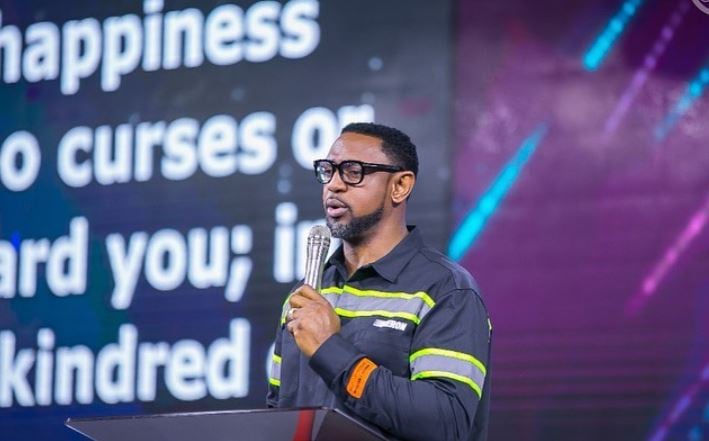Biodun Fatoyinbo, senior pastor of the Commonwealth of Zion Assembly (COZA), has defended David Oyedepo over the sack of 41 pastors from his ministry.
Oyedepo had come under fire after Living Faith Church Worldwide (LFCWW), his church, fired the pastors for not meeting certain growth benchmarks.
The cleric had earlier justified the decision to sack the pastors, describing them as “unfruitful and blatant failures”.
But his stance had further ignited the dust surrounding the matter, particularly on the social media.
In an Instagram post on Friday, Fatoyinbo dismissed criticisms trailing the church’s decision, arguing that there is no room for “laziness and unfruitfulness.”
Fatoyinbo, who shared a video of Oyedepo’s reaction to the matter, wondered if the affected pastors would have announced their sack on social media it they were dismissed by a bank.
“Question! ‘if you were fired in the Bank for not meeting up with your deliverables will you go on social media?” he queried.
Buttressing his point, the cleric also cited the biblical parable wherein Jesus condemned a fig tree for not producing fruit as expected.
“He (Jesus) spake also this parable; A certain man had a fig tree planted in his vineyard; and he came and sought fruit thereon, and found none,” he added.
“Then said he unto the dresser of his vineyard, Behold, these three years I come seeking fruit on this fig tree, and find none: cut it down; why cumbereth it the ground?
“And he answering said unto him, Lord, let it alone this year also, till I shall dig about it, and dung it: And if it bear fruit, well: and if not, then after that thou shalt cut it down. Luke 13 : 6 – 9.”
In 2019, Fatoyinbo had been in a legal battle with Busola Dakolo, a celebrity photographer, who had gone public to accuse him of raping her on two occasions when she was a teenager.
An Abuja court, however, dismissed Busola’s claims, ordering the photographer’s lawyer to pay N1 million fine for wasting its time and abusing judicial procedures.
Copyright 2025 TheCable. All rights reserved. This material, and other digital content on this website, may not be reproduced, published, broadcast, rewritten or redistributed in whole or in part without prior express written permission from TheCable.
Follow us on twitter @Thecablestyle


Jesus told the Parable of the Fig Tree—Luke 13:6-9—immediately after reminding His listeners of a tower over the pool of Siloam (John 9:7) which unexpectedly fell and killed eighteen people. The moral of that story is found in Luke 13:3: “Unless you repent, you will likewise perish.” To reiterate this moral, Jesus tells the story of the fig tree, the vineyard owner, and the gardener who took care of the vineyard.
The three entities in the story all have clear symbolic significance. The vineyard owner represents God, the one who rightly expects to see fruit on His tree and who justly decides to destroy it when He finds none. The gardener, or vineyard keeper who cares for the trees, watering and fertilizing them to bring them to their peak of fruitfulness, represents Jesus, who feeds His people and gives them living water. The tree itself has two symbolic meanings: the nation of Israel and the individual.
As the story unfolds, we see the vineyard owner expressing his disappointment at the fruitless tree. He has looked for fruit for three years from this tree, but has found none. The three-year period is significant because for three years John the Baptist and Jesus had been preaching the message of repentance throughout Israel. But the fruits of repentance were not forthcoming. John the Baptist warned the people about the Messiah coming and told them to bring forth fruits fit for repentance because the ax was already laid at the root of the tree (Luke 3:8-9). But the Jews were offended by the idea they needed to repent, and they rejected their Messiah because He demanded repentance from them. After all, they had the revelation of God, the prophets, the Scriptures, the covenants, and the adoption (Romans 9:4-5). They had it all, but they were already apostate. They had departed from the true faith and the true and living God and created a system of works-righteousness that was an abomination to God. He, as the vineyard owner, was perfectly justified in tearing down the tree that had no fruit. The Lord’s ax was already poised over the root of the tree, and it was ready to fall.
However, we see the gardener pleading here for a little more time. There were a few months before the crucifixion, and more miracles to come, especially the incredible miracle of the raising of Lazarus from the dead, which would astound many and perhaps cause the Jews to repent. As it turned out, Israel as a nation still did not believe, but individuals certainly did (John 12:10-11). The compassionate gardener intercedes for more time to water and fertilize the fruitless tree, and the gracious Lord of the vineyard responds in patience.
The lesson for the individual is that borrowed time is not permanent. God’s patience has a limit. In the parable, the vineyard owner grants another year of life to the tree. In the same way, God in His mercy grants us another day, another hour, another breath. Christ stands at the door of each man’s heart knocking and seeking to gain entrance and requiring repentance from sin. But if there is no fruit, no repentance, His patience will come to an end, and the fruitless, unrepentant individual will be cut down. We all live on borrowed time; judgment is near. That is why the prophet Isaiah wrote, “Seek the LORD while he may be found; call on him while he is near. Let the wicked forsake his way and the evil man his thoughts. Let him turn to the LORD, and he will have mercy on him, and to our God, for he will freely pardon” (Isaiah 55:6-7).